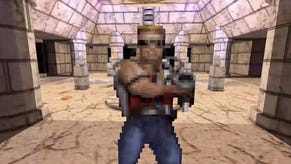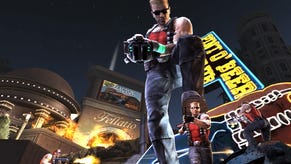Duke Nukem Forever
The king is dead.
Randy Pitchford is thinking of me. "I would not want to be a journalist on this one," the Gearbox studio boss told Mr Minkley in our Duke Nukem Forever launch day interview. "I would not want to be a critic. It's going to be tough."
His concern, presumably, is that Duke Nukem Forever is such a monumental event, such a literally game-changing, epoch-shaking moment, that the pressure to accommodate its many facets in a single review - to boil down 14 years of expectation into a fair critical summary - is too terrible a burden for any writer to bear. Duke Nukem Forever! It's here! How can things ever be the same again?
I certainly felt that pressure. Do you let the game's famously troubled gestation - which looked like it would never come to term, until Gearbox stepped in at the eleventh hour - affect the score? Do you try to filter its off-colour humour through a modern lens, or accept the adolescent scatology as part of the Duke experience? Do you review for middle-aged fans from 1996, when Duke last appeared in a first-person shooter, or do you review for a generation of gamers that was still in infant school when our flat-top hero first asked pixellated strippers to "Shake it, baby"? So much to consider. Randy's right. It's going to be tough.
Except, with joypad in hand, reviewing Duke Nukem Forever actually proves incredibly simple. Everything else becomes a sideshow when the main event is so obviously, heart-breakingly disappointing on almost every level. The toughest part is deciding where to begin.
The visuals that jump out at you first. This is an ugly game, committing practically every graphical sin imaginable. Textures are crude and blurry when they bother to load in at all. Jagged edges turn every diagonal into ziggurat steps while the frame rate chugs up and down. Lumpen and stuttering, Forever does not look like a game that has benefited from millions of hours of development time.
[Please note that we reviewed the game on Xbox 360, but Digital Foundry's Richard Leadbetter informs us that the PC version plays much better. "It's a complete mess on 360 - sub-HD resolutions, hugely obtrusive screen-tear, terrible aliasing, low frame rate," he says. "All of these things can be remedied by playing the game on PC. It doesn't transform it into a good game, but it makes it much easier on the eye and certainly smoother, far more responsive and thus more enjoyable to play." Look out for Rich's full Duke Nukem Forever Face-Off very soon. -Ed.]
It's the gameplay that's important, of course, but beneath the glitchy surface things aren't much better. Aiming is jerky and imprecise, even after tinkering with the sensitivity. Movement is heavy and sticky, frequently leaving you snagged on scenery or bumping up against invisible walls. Both jumping and running feel sluggish, with Duke's grunts suggesting that he probably should have put some more gym time in before his big comeback.
The physics is spotty at best. This is most obvious when you try some of the environmental interactions scattered throughout the game. Pinball tables offer perhaps the worst ball physics in living memory. Basketball hoops repel balls with forcefields apparently six inches away from the net. There's an air hockey game with such skittish animation that you'd swear it was a Flash file being streamed over a dial-up modem.
Level design isn't much better, with few of the locations inspiring the sort of exploration and excitement that made Duke 3D such a memorable experience. Duke Nukem Forever is linear to a fault, and huge chunks of the game are spent simply walking from one fight to another through uninspired corridors.
Most alarmingly, all the weapons are repeated from 1996, and there are no new enemy types either. While old favourites like the shrink ray and the devastator are still satisfying to use, it beggars belief that of all the hundreds of people involved in this game over the years, nobody could come up with a single idea for a new gun or enemy.
















